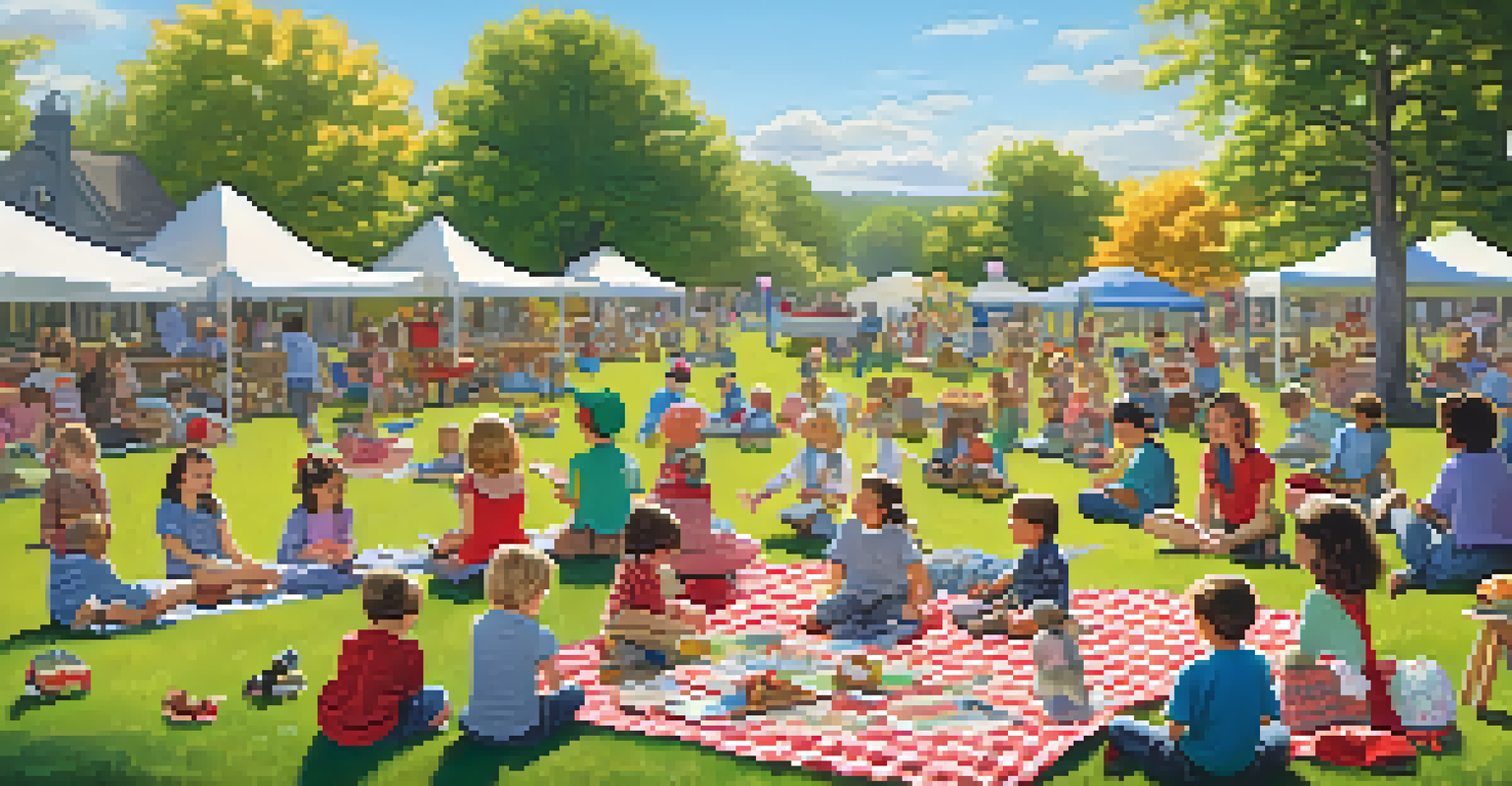Childhood Melodies: Songs That Define Our Early Years

The Joy of Nursery Rhymes in Early Childhood
Nursery rhymes are often the first songs we hear as children, introducing us to rhythm and melody. These simple tunes capture our imagination and serve as a foundation for language development. Think about classics like 'Twinkle, Twinkle, Little Star'—they not only entertain but teach us about the world around us.
Music can change the world because it can change people.
As we sing along, we learn about patterns, sounds, and even storytelling. The repetitive nature of nursery rhymes makes them easy to remember, creating a comforting sense of familiarity. This early exposure to music can foster a lifelong love of singing and creativity.
Moreover, these rhymes often come with hand gestures or actions, making them interactive and engaging. They become a shared experience between caregivers and children, strengthening bonds while laying the groundwork for social skills and emotional connections.
The Impact of Disney Songs on Our Generations
Disney songs have a unique way of weaving themselves into the fabric of our childhood memories. From 'A Whole New World' to 'Let It Go,' these songs transport us into magical realms that spark our imaginations. They often carry themes of love, bravery, and friendship, resonating deeply with young listeners.

Many of us can recall singing these anthems at home, in the car, or even in school. The catchy tunes and relatable lyrics make them not just songs but anthems of our formative years. It's fascinating how these melodies continue to echo in our lives as we grow older.
Nursery Rhymes Foster Language Skills
Nursery rhymes introduce children to rhythm and language, promoting early language development through repetition and melody.
Disney songs also play a significant role in family bonding. Whether it’s a sing-along during movie nights or a soundtrack to road trips, these melodies create memorable moments that families cherish. They become part of our shared experiences, reinforcing connections across generations.
Classic Children's Songs That Stand the Test of Time
Songs like 'The Wheels on the Bus' and 'Old MacDonald Had a Farm' have been beloved for decades, reminding us of the simplicity of childhood. These songs often incorporate fun movements and sounds, making them interactive and enjoyable for kids. They encourage participation, fostering a sense of community and joy.
Children are made readers on the laps of their parents.
These classics also serve an educational purpose, helping children learn about animals, vehicles, and everyday life. By engaging with these songs, kids develop memory and motor skills while having fun. It's a testament to the power of music in learning.
Moreover, these songs often get passed down through generations, creating a shared cultural heritage. Parents singing them to their children reinforce not only the melody but also the values and stories that come with them, enriching the overall experience.
The Role of Lullabies in Nurturing Bonds
Lullabies hold a special place in our hearts, often associated with comfort and security. The soft melodies and soothing lyrics help to calm babies and create a peaceful environment for sleep. Think of classics like 'Rock-a-bye Baby,' which have been sung for generations to lull children into slumber.
These gentle songs not only promote relaxation but also strengthen the bond between caregiver and child. The act of singing a lullaby creates a nurturing atmosphere where love and care are transmitted through music. It’s a simple yet profound way to connect during those quiet moments.
Disney Songs Create Lasting Memories
Disney songs become anthems of childhood, fostering family bonding and evoking cherished memories as children grow.
Furthermore, lullabies can have a lasting impact, influencing a child's emotional development. The familiarity of these tunes can evoke feelings of safety and warmth, which are essential for healthy emotional growth. As children grow, these melodies often remain cherished memories.
The Influence of Pop Music on Young Minds
As children grow older, they often shift from nursery rhymes to pop music, which plays a significant role in shaping their identities. Artists like Taylor Swift and Justin Bieber capture the hearts of young fans with relatable lyrics and catchy tunes. These songs not only entertain but also provide a soundtrack to their evolving lives.
Pop music can serve as a means of self-expression for children and teens, allowing them to connect with their emotions and experiences. The themes of love, friendship, and personal growth resonate with them, making these songs feel like a personal narrative. It’s like having a friend in music who understands their struggles and triumphs.
Additionally, pop songs often spark conversations among peers, creating a shared cultural experience. Singing along to the latest hits at school or discussing favorite artists can foster friendships and social connections. Music becomes a bridge that brings young people together.
Cultural Songs That Enrich Our Childhood Experiences
Every culture has its own set of songs that define childhood experiences, from traditional folk songs to modern anthems. These songs often reflect the values, stories, and history of a community, enriching the lives of children. For instance, songs like 'Frère Jacques' teach not just music but also cultural heritage.
Participating in these musical traditions can instill a sense of pride and belonging in children. They learn about their roots and the significance of their culture through melodies and lyrics. This connection to their heritage can be empowering, especially as they navigate their identity.
Cultural Songs Enhance Identity
Cultural songs enrich children's experiences by connecting them to their heritage, values, and community through engaging melodies.
Moreover, cultural songs often come with dances and interactive elements that encourage participation. This makes learning about one’s culture fun and engaging. These experiences can create lasting memories and a deep appreciation for diversity in music.
The Lasting Impact of Childhood Melodies on Our Lives
As we grow older, the songs from our childhood often linger in our minds, evoking nostalgia and fond memories. These melodies can transport us back to simpler times, reminding us of the innocence and joy of being a child. They become a soundtrack to our life experiences, influencing our tastes and preferences.
Interestingly, studies show that music from our youth can evoke powerful emotions and even trigger memories. A simple tune can bring back a flood of memories, whether it's a family gathering, a favorite toy, or a beloved pet. It's remarkable how deeply intertwined music is with our life stories.

Ultimately, childhood melodies shape not just our early years but also how we connect with others throughout our lives. They create a shared language that transcends time and space, reminding us of the universal experiences of growing up. It's a beautiful reminder of how music can bond us all.